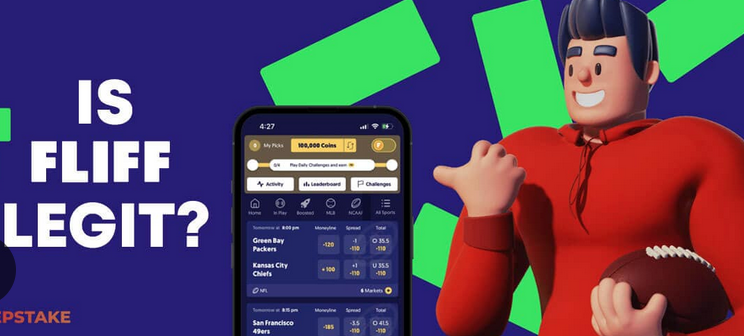Fliff App a 'Gateway to Gambling Addiction'?
Ohio is the latest state that has begun questioning Dave & Busters grandiose - and likely ill-fated - plans to allow betting on arcade games in its stores. The restaurant, bar and entertainment chain is popular mostly with young people, almost a Chuck E. Cheese for teens, with a bar for their parents.
Ohio Concerns
The setup is based on a peer-to-peer type gambling system, described as similar to a "winner takes all" format. Customers will not be betting against the house, in this case Dave & Buster's.
A spokesperson for the Ohio Casino Control Commission told CNBC they have reached out to the chain to learn more about this concept. Ohio is one of the few states where bars, restaurants, gas stations, convenience stores and even bowling alleys can obtain a license to offer sports betting kiosks.
Illinois Addressing This Matter
A bill in the Illinois state legislature was filed on Thursday by state Rep. Daniel Didech (D-Buffalo Grove) that would prohibit the family amusement chain from facilitating wagering on amusement games.
“It is inappropriate for family-friendly arcades to facilitate unregulated gambling on their premises. These businesses simply do not have the ability to oversee gambling activity in a safe and responsible manner,” Didech said in a statement.
"I think there are some spaces and environments that are just not appropriate for gambling to be pushed on people, especially places where there are lots of children," he added.
The bill seeks to
- Prevent family amusement establishment venues from facilitating wagering on amusement games.
- Prevent said establishment from engaging in advertising that promotes wagering on amusement games.
“Gambling establishments are among the most strictly regulated businesses in Illinois. Everyone involved in the gambling industry in Illinois undergoes thorough background checks, is required to implement security protocols, can only offer games that are fair and safe for players, and must create a responsible environment to protect minors and problem gamblers. It is inappropriate for family-friendly arcades to facilitate unregulated gambling on their premises. These businesses simply do not have the ability to oversee. gambling activity in a safe and responsible manner.
|
|
North Carolina Action
Law enforcement descended upon multiple gambling establishments across the Charlotte and other regions of North Carolina last month, raiding a handful of establishments allegedly operating "fish arcades" for gambling purposes. There were a series of arrests as a result.
North Carolina has outlawed electronic sweepstakes machines. Penalties for operating these games are considered a Class 1 misdemeanor. Repeat offenses can elevate the crime as high as a Class G felony.
Several types of devices fall under the category of a sweepstakes machine, WCNC explains. These include "a video game based on or involving the random or chance matching of different pictures, words, numbers, or symbols not dependent on the skill or dexterity of the player."
A similar game appears to be found in Dave & Buster's establishments.
High Stakes for High Schoolers: New York Post Reports on the Problem of Teen Gambling
According to the National Council on Problem Gambling, 60-80% of high school students reported gambling money in the past year, even though the legal age ranges from 18-21.
They also report that high schoolers “have twice the rate of gambling problems as adults.”
Colby Colrone of the New York Post writes that, even though DraftKings, FanDuel and other popular sports betting apps require individuals to be at least 21 to open accounts, teens still find ways to set up accounts and place sports bets.
From the New York Post:
“Take Syracuse minus 7 tonight, thank me later.”
“Let me cook up this parlay!”
These are real remarks heard in the halls of my high school, and they are not uncommon to hear from the mouths of students as young as 9th grade.
Every teen sports gambler has dreams of hitting it big one day on a parlay with more legs than a millipede, but they don’t take a step back to examine the numerous risks.
It's not immediately clear how Colrone believes these youth are able to fund the apps.
High school sports gambling isn’t just a problem, it’s an epidemic, Colrone writes.
It’s time for schools to focus on the root cause of online teen sports gambling by implementing gambling prevention education in all high schools. Health class curricula across the nation cover the typical health risks for teens such as smoking, vaping, drinking, etc., yet gambling education is nowhere to be found in our schools.
Teens need education and knowledge to change their ways, and it’s currently non-existent in the sports gambling space, despite the staggering number of underage users, which is only on the rise. In 2022, a bill designed to add school instruction on gambling addiction was easily passed in the Virginia Senate, but similar bills in other states have stalled.

Colrone singles out the app Fliff as a primary "gateway" to gambling addiction. Fliff claims to be a “free-to-play social sportsbook”, which allows users to make “sports predictions as a play-for-fun game”.
Fliff CEO, Matt Ricci, calls his company an “introductory tool” for those curious about sports gambling.
Underage sports bettors flock to the app and think nothing of it. To them, it seems like just another way to express that pure joy of sports fandom. But, no.
Subconsciously, multitudes of high schoolers are likely becoming addicted to gambling to the point that, “it [Fliff] is the most used app on my phone”, according to one 11th grader.
It doesn’t matter that it’s “free-to-play” or “play-for-fun”; this is a ride going full speed through that ‘gate’. Before teens know it, the same previously free bets will hold high dollar amounts on ‘real’ betting apps.
|
|


















